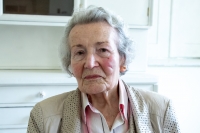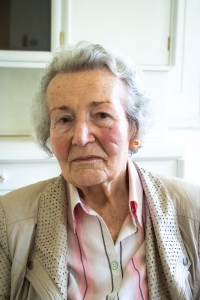Return to the mill of my birth
Stáhnout obrázek
Annemarie Kist was born on 3 April 1933 at the mill in Stráž nad Ohří, as the oldest of three children of the local miller. For four years, Annemarie attended the German elementary school in Stráž and later commuted by train to the grammar school in Kadaň. Her father Franz Glaser served for almost two years in the Wehrmacht, but worked at the mill for most of the war. In 1945, Annemarie witnessed waves of refugees from the bombed German towns, as well as the march of freed prisoners from the concentration camp and finally the wild expulsion of her own family. They were allowed to pack almost nothing, the father was arrested and the remaining family was taken to the camp in Prunéřov. There they spent several weeks in the assembly hall of a former aircraft factory, until being driven to the Saxony border in carts, then by train to Chemnitz. Their father escaped from forced labour, met up with his family and gradually managed to build up his own mill in East Germany. When it was nationalised and taken from them in 1951, their father escaped to West Germany. The mother, children and grandmother remained in the GDR and the parents later divorced. Annemarie became a teacher, also distance studying in Potsdam. In 1957 she married. She travelled to Czechoslovakia often, namely to Prague to visit her aunt. She’s happy that the mill of her birth is being repaired and was able to give an interview to Memory of Nations directly from the spot.

